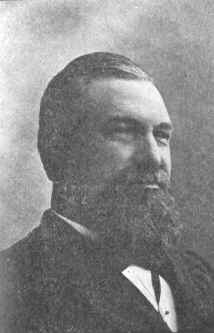|
Samuel E. Winger
|
||
|
biography
|

Samuel E. Winger, was born at President, Pa., December 3d, 1850, was
left a fatherless boy at twelve years of age, converted at sixteen, was
impressed that he ought to enter the ministry, stifled conviction, and
while undergoing a severe conflict as to duty, was licensed to exhort,
sought divine direction as to life’s work and received such a definite
call into the ministry that he immediately began preparation therefor. He
studied at home, in preparatory schools, at Allegheny College, in Drew
Theological Seminary, and throwing his while soul into the work of
preparation he became a master in the branches he studied, especially of
works that would help him in the ministry. He was licensed to preach by
Trinity Church, Oil City, in 1870, received on trial in Erie Conference in
1872, into full connection in 1874, ordained deacon the same year, and
Elder in 1876, both ordinations being by Bishop J.
T. Peck. He served faithfully and cheerfully amid the hardships of
an Itinerant’s life, various Charges in Erie Conference, did effective
work as a Missionary in Montana, being stationed at Helena, the Capital of
the State, in 1881 and 1882, was superannuated in 1906 and on Sabbath,
February 8th, 1912, he climbed the Heavenly Heights to glory and entered
into the Sabbath of eternal rest. David and Katherine Winger,
being Germans, his was a long line of German ancestors, and he was
possessed of that intense fervor, indomitable will, unswerving devotion to
duty, unquestioning obedience to authority, and other sterling qualities
that characterize the descendants of the immigrants from the fatherland.
He was married on New Year’s Day. 1873 to Miss Eva
F. Clyde, a daughter of Rev. James Clyde,
formerly a member of this Conference, and to them were born four sons and
five daughters, one of whom, Eva Mabel,
preceded him, in infancy, to the glory world; the others live to honor and
revere his memory. He is also survived by four brothers and one sister.
Dr. Winger was a
great preacher, never preaching a poor sermon, while some of his sermons
were great masterpieces of pulpit oratory and would have done honor to any
pulpit in the hand. He was thoroughly orthodox from the Methodist
stand-point, emphasizing the distinctive doctrines of our beloved Church,
such as the witness of the Spirit, Entire Sanctification as taught by
John Wesley and preached by the Fathers of Methodism, the universality of
the atonement and in the presentation of these great themes he poured all
the ardor of his great loving heart, all the energy of his being and all
the power of discriminating thought, causing his audiences not only to
feel that the speaker believed the great truths he preached, but
compelling conviction upon the part of his auditors. In prayer he laid
hold upon the arm of the Almighty and seemed to bring Heaven down to
earth. His denunciations of sins were scathing and unsparing and yet his
great warm heart throbbed with love for the sinner.
He was loyal to the
policy of Methodism, never figured for place or preferment, never worried
Bishops or Presiding Elders about giving him good appointments, went
cheerfully and uncomplainingly to the Charges to which he was assigned and
was glad for any place where he might preach Jesus Christ and hold Him up
as the Savior of men. He often found the meagre support accorded him as
pastor too small for the demands of his family, that they might have the
education he desired for them, and at one time contemplated entering
another profession that would be more lucrative, but, believing that in
the divine call to the ministry, he was called for life he relinquished
that thought and persevered as a preacher of righteousness. When nearing
the crossing, on being asked by his wife if he were not glad that he had
stood true to his post through all the hardships of the years, he replied
with great fervor and earnestness that he was glad and gave signs of great
joy because of his preaching Christ to the close of his earthly career. His last
appointment was Seneca Charge, which he served very acceptably, and being
returned thereto at the Conference Session of 1911, he entered the work
very hopefully, hooking for the best year of his ministerial life. He was
not able to continue his work long after Conference, but hoped after a few
weeks to be able to resume his labors. It was not to be for his ailment
was a fatal one, baffling the skill of physicians and surgeons, and
despite the loving attentions given him by a devoted family. As long as
strength permitted, he joined with the family in singing the songs of Zion
with that sweet strong voice of his and with a child-like trust, with his
hands in those of a loving Father, went down into the valley of the
Shadow, and then when nature’s struggle ended a beautiful smile
illumined his face as he relinquished himself into the hands of the
Christ. When taken to the hospital, the physicians assured the family that
they would have him back home for a few weeks at least after the surgical
operation, but that was not to be. During those last days of intense
suffering and excruciating pain, he was very patient and re signed, facing
the inevitable with the gentleness of a Christian and the bravery of a
great soul. As that last Sabbath was dawning, the one in which he entered
into that eternal Sabbatic rest, he quoted many beautiful passages of
Scripture, especially emphasizing Psalm XXIV:7-10, “Lift up your heads,
O ye gates; and be ye lift up, ye everlasting doors; and the King of Glory
shall come in—Who is this King of Glory? The Lord of Hosts, He is the
King of Glory.” He was asked particularly concerning his last Charge,
Seneca, and on the day of the week in which he had so regularly, through
storm or sunshine gone forth to labor for the Master to preach to
congregations of interested listeners he went into the congregation of the
blood-washed to wear a glittering crown throughout the eternities. “O
may I triumph so, When
all my warfare’s past, And,
dying, finch my latest foe Under
my feet at last.” By A. R. Rich, Journal and Yearbook, Erie
Conference, 1912, pages 115-117 |
